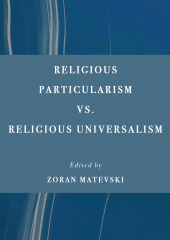Religious Particularism vs. Religious Universalism
216 p.
The process of globalization means that borders between societies are becoming less important, and socio-cultural developments in certain societies are increasingly influenced by events from other parts of the world. This creates two opposing social effects. On the one hand, there is a risk of clashes between different religions, which are present within a social community. On the other hand, these close contacts among different religions may diminish differences among them, and thus reduce tensions and conflicts. book explores the conflict between particularism and universalism. Particularism emphasizes the importance of the characteristics of particular social groups; ethnic, cultural, religious, and regional. Unlike particularism, universalism emphasizes the importance of similarities among people and systems of values in individual societies. The authors in this collection address some of the important issues at the interface of particularism and universalism, including the role of religion as a mitigator
of the influence of global processes; fundamentalism as a form of collective identity; and the idea of ecumenism and neo-ecumenism as myth or reality. An important collection for scholars and researchers in religion and faith, politics, and globalization. [Publisher's text].
Special access authorizations may apply; please contact us for further information.
-
Información
ISBN: 9781804411759
MATERIAS


